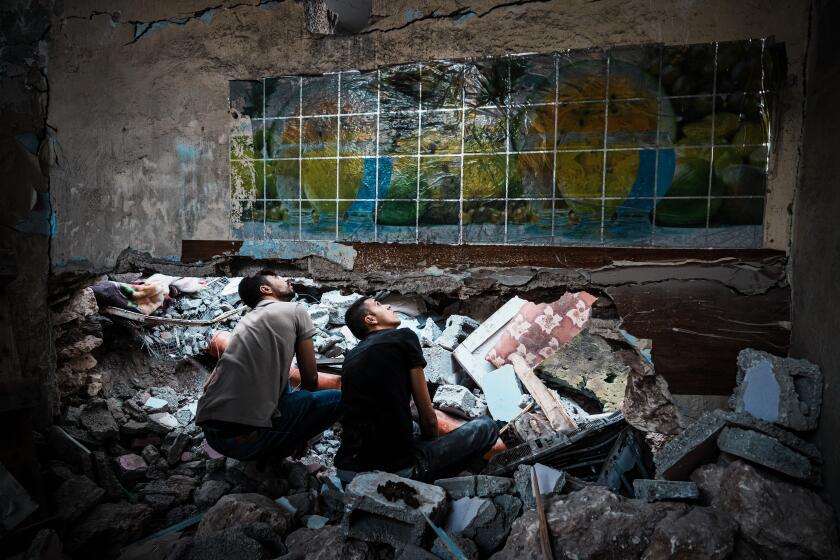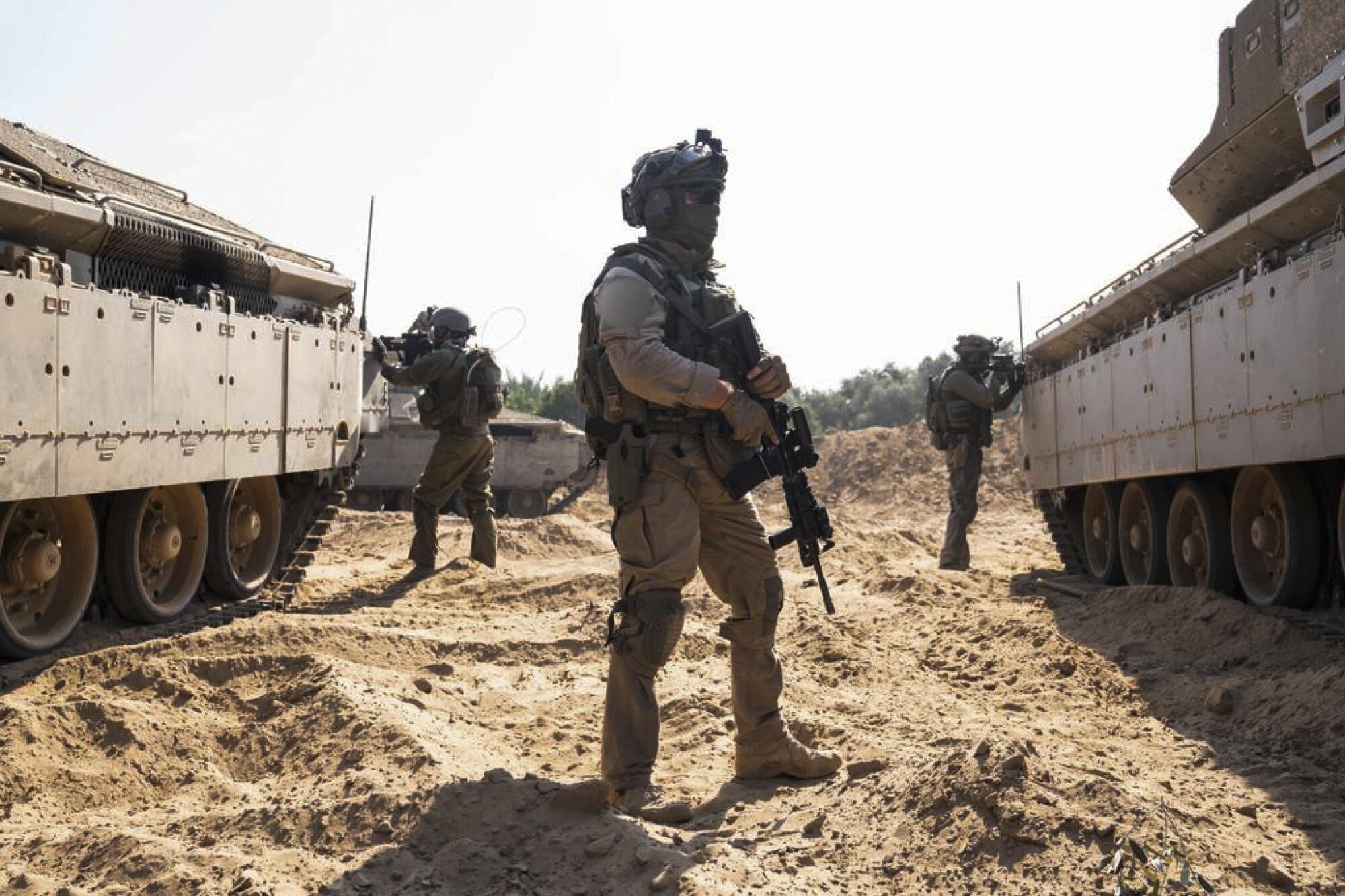
- Share via
DEIR AL BALAH, Gaza Strip — Israeli troops fought with Hamas militants and encircled Gaza City on Thursday, the military said, as the Palestinian death toll rose above 9,000. After nearly four weeks of war following Hamas’ deadly rampage in Israel, U.S. and Arab leaders raised pressure on Israel to ease its siege of Gaza and at least briefly halt its attacks in order to aid civilians.
U.S. Secretary of State Antony J. Blinken was heading to the region for talks Friday in Israel and Jordan, after President Biden suggested a humanitarian “pause” in the Gaza fighting to let in aid for Palestinians and let out more foreign nationals.
Roughly 800 people — including hundreds of Palestinians with foreign passports and dozens of wounded — have been allowed to leave Gaza over the last two days under an apparent agreement among the U.S., Egypt, Israel and Qatar, which mediates with Hamas.
Israel did not immediately respond to Biden’s suggestion. But Prime Minister Benjamin Netanyahu has previously ruled out a cease-fire, vowing to destroy Hamas rule in the Gaza Strip after its militants killed hundreds of men, women and children on Oct. 7 and took some 240 people captive.
“We are advancing,” Netanyahu said on Thursday. “Nothing will stop us.”
An airstrike Thursday smashed a residential building to rubble in the Bureij refugee camp several miles south of Gaza City. One boy, his face covered in blood, cried as workers dug him out of the dirt and wreckage. Others rushed wounded men and women, covered in dust, away on stretchers or wrapped in blankets. At a nearby hospital, doctors tried to stanch the flow of blood from the head of a child laid out on the floor.
At least 15 people were killed, Gaza’s Civil Defense spokesperson said, and residents said dozens more were believed buried. The strike took place in the southern zone to which Israel has told residents of the north to flee.
Arab countries, including those allied with the U.S. and at peace with Israel, have expressed mounting unease with the war. Jordan recalled its ambassador to Israel and told Israel’s envoy to stay out of Jordan until there’s a halt to the war and the “humanitarian catastrophe” it is causing.
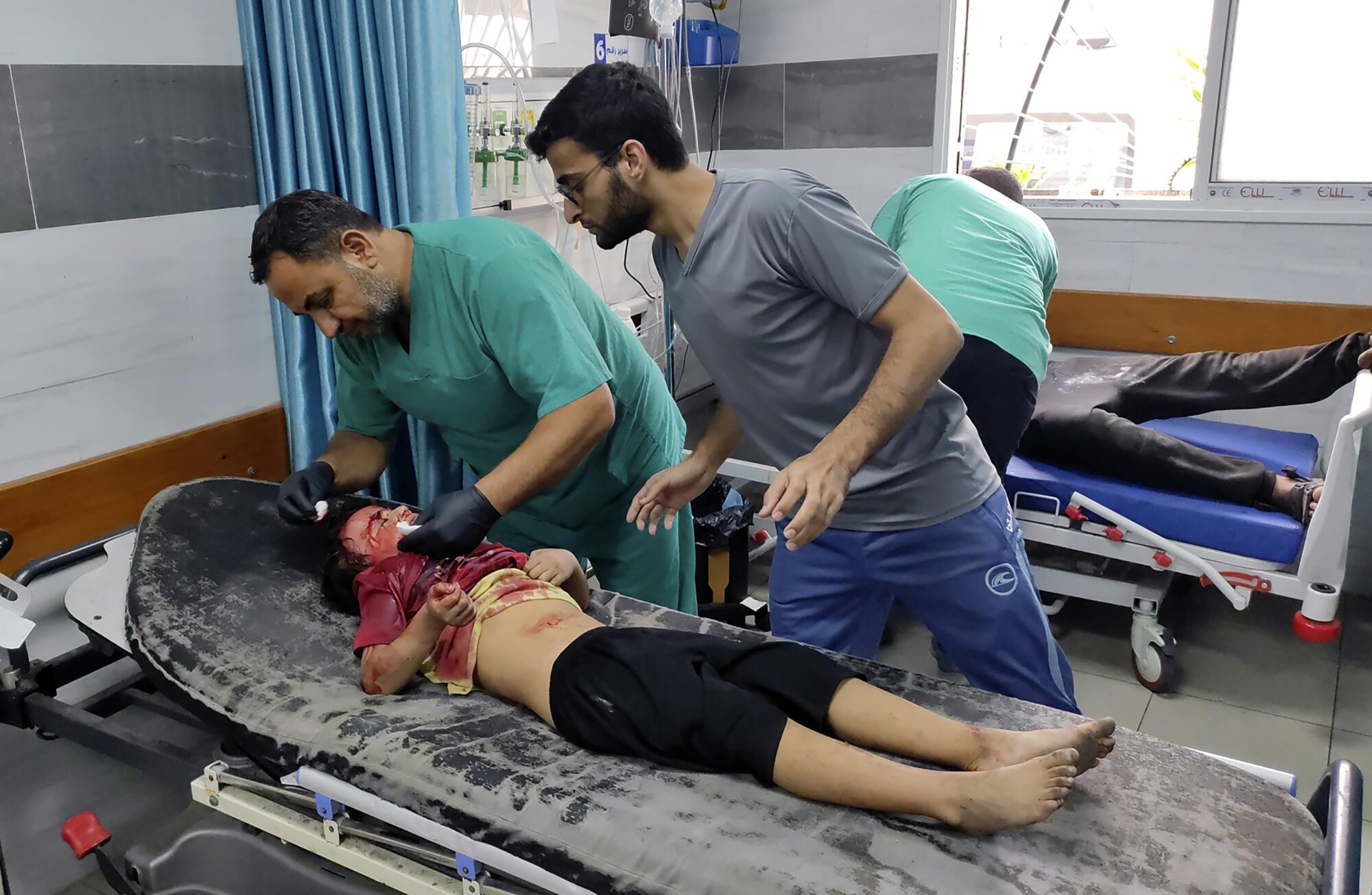
A flurry of heavy explosions raised clouds of smoke over Gaza City on Thursday. Al Jazeera television, which continues to broadcast from the city, said Israeli airstrikes were hitting an area of apartment towers in the Tel al-Hawa neighborhood.
The barrage hit around 100 yards from Al Quds Hospital, the Palestinian Red Crescent Society said in a post on X. It said there were deaths and injuries but gave no more details.
There was no immediate comment by the Israeli military on the strikes. Israel says it targets Hamas fighters and infrastructure and that the group endangers civilians by operating among them and in tunnels under civilian areas.
The U.S. has pledged unwavering support for Israel in its campaign against Hamas.
But the Biden administration has pushed for Israel to let more aid into Gaza amid growing alarm in the region over the destruction and humanitarian crisis in the tiny Mediterranean enclave.
More than 3,700 Palestinian children have been killed in 25 days of fighting, and bombings have driven more than half of the territory’s 2.3 million people from their homes as food, water and fuel run low.
Israel has allowed more than 260 trucks carrying food and medicine through the crossing, but aid workers say it’s not nearly enough. It has refused to allow fuel in, saying Hamas is hoarding fuel for military use and would steal new supplies.
White House national security spokesman John Kirby said the U.S. was not advocating for a general cease-fire but a “temporary, localized” pause.
In a sign that Israel might be feeling the international pressure, the military put out a late-night statement, in English, insisting it did not want civilians to be harmed.
“I want to make something very clear,” military spokesman Brig. Gen. Daniel Hagari said in a recorded video. “Israel is at war with Hamas. Israel is not at war with the civilians in Gaza.”
Israel and the U.S. seem to have no clear plan for what would come next if Hamas rule in Gaza is brought down — a key question on Blinken’s agenda during his upcoming visit, according to the State Department.
Earlier in the week, Blinken suggested that the Palestinian Authority govern Gaza. Hamas drove the authority’s forces out of Gaza in its 2007 takeover of the territory. The Palestinian Authority now holds limited powers in some parts of the Israeli-occupied West Bank.
A senior Hamas official, Ghazi Hamad, dismissed Blinken’s visit, saying the U.S. aims “to give more cover for the vicious assault on Gaza” and “impose its own political solutions.”
On Thursday, 342 Palestinians with foreign passports, 21 injured in the fighting, and an additional 21 companions, left Gaza through the Rafah crossing into Egypt, according to Wael Abu Omar, a spokesman for the Palestinian Crossings Authority. At least 335 people with foreign passports, and 76 injured and their companions, were evacuated on Wednesday, he said.
Their departure came after weeks of talks. It was the first time people left Gaza other than the four hostages released by Hamas and another rescued by Israeli forces. Israel has also allowed more than 260 trucks carrying food and medicine through the crossing, but aid workers say it’s not nearly enough.
U.S. officials said 79 Americans were among those who have gotten out so far. The U.S. has said it is trying to evacuate 400 Americans with their families.
Egypt has said it will not accept an influx of Palestinian refugees, fearing Israel will not allow them to return to Gaza after the war.
Israeli troops pushed into Gaza in larger numbers over the weekend after three weeks of heavy airstrikes that have demolished entire neighborhoods. The war is the fifth and by far deadliest in Gaza.
While Palestinians are horrified by Israel’s war in Gaza, many are also angry with what they see as their own weak and useless official leadership.
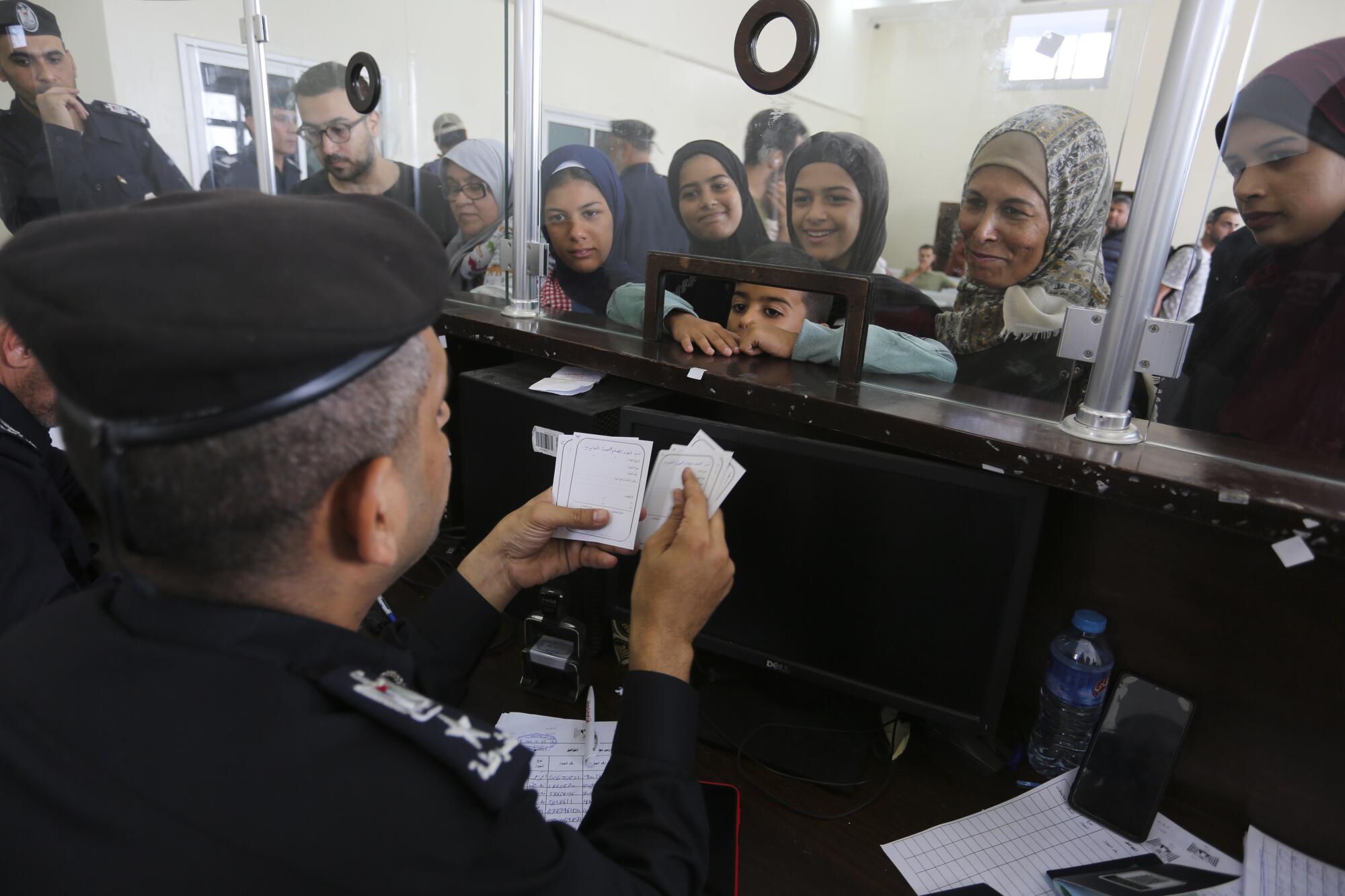
Military officials said Israeli forces had completely encircled Gaza City, a densely packed cluster of neighborhoods that Israel says is the center of Hamas military infrastructure and includes a vast network of underground tunnels, bunkers and command centers.
Israeli forces are “fighting in a built-up, dense, complex area,” said the military’s chief of staff, Herzi Halevy.
Military spokesman Brig. Gen. Daniel Hagari said Israeli forces were in “face-to-face” battles with militants, calling in airstrikes and shelling when needed. He said they were inflicting heavy losses on Hamas fighters and destroying their infrastructure with engineering equipment.
Casualties on both sides are expected to rise as Israeli troops advance toward the dense residential neighborhoods of Gaza City. Israeli officials say Hamas’ military infrastructure, including tunnels, is concentrated in the city in and under civilian areas.
On Thursday, Israeli planes dropped leaflets warning residents to immediately evacuate the Shati refugee camp, a densely built-up district on the Mediterranean coast bordering Gaza City’s center.
“Time is up,” the leaflets read, warning that strikes “with crushing force” against Hamas fighters were coming.
Hundreds of thousands of Palestinians remain in the path of the fighting in northern Gaza, despite Israel’s repeated warnings for them to evacuate to the territory’s south, which is also being bombarded.
Palestinian militants fired antitank missiles, set off explosive devices and hurled grenades at Israeli troops during an overnight battle, the Israeli military said Thursday. It said soldiers returned fire and called in artillery, as well as strikes from a helicopter and a naval ship. The report could not be independently confirmed.
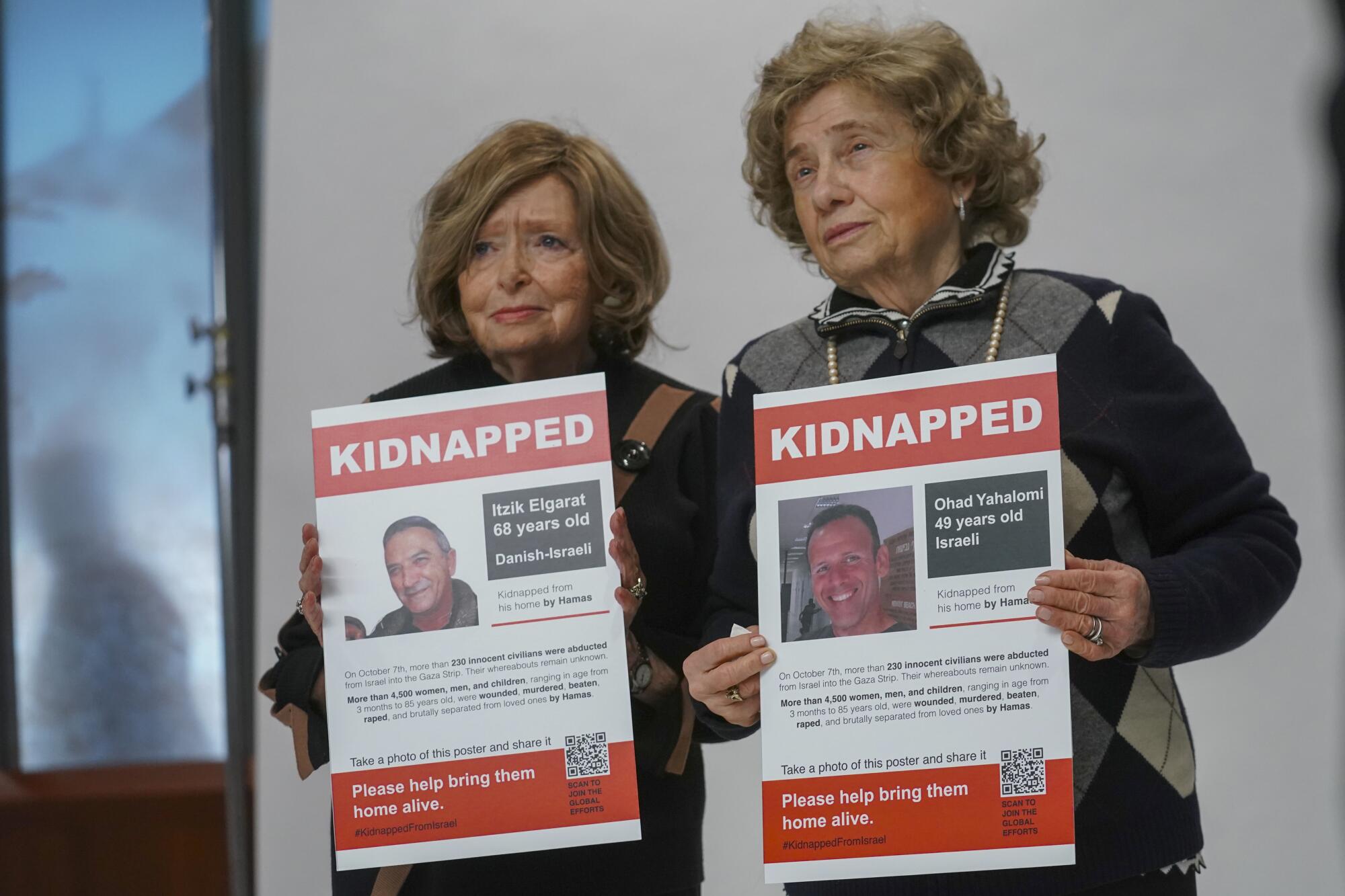
At least 9,061 Palestinians have been killed in the war, mostly women and children, and more than 32,000 people have been wounded, the Gaza Health Ministry said Thursday, without providing a breakdown of civilians and fighters. The figure is without precedent in decades of Israeli-Palestinian violence and is around four times the toll from the 2014 Israel-Hamas war, which lasted more than six weeks.
Four Palestinians, including three teenagers, were shot dead in different parts of the occupied West Bank early Thursday, the Palestinian Health Ministry said. More than 130 Palestinians have been killed in the West Bank since the start of the war, mainly in violent protests and gun battles during Israeli arrest raids.
An Israeli man died after a suspected militant opened fire on his car near a settlement in the West Bank on Thursday, the military and medics said.
More than 1,400 people have died on the Israeli side, mainly civilians killed in massacres during Hamas’ initial attack, also an unprecedented figure. Nineteen Israeli soldiers have been killed in Gaza since the start of the ground operation. A suspected militant shot to death an Israeli reserve soldier driving near a West Bank settlement Thursday, the military and medics said.
FBI Director Christopher Wray is warning that Hamas’ rampage inside Israel could inspire violence in the U.S., he told lawmakers Tuesday.
Rocket fire from Gaza into Israel and daily skirmishes between Israel and Lebanon’s Hezbollah militants have disrupted life for millions of Israelis and forced an estimated 250,000 to evacuate towns near the border in the north and south. Most rockets are intercepted or fall in open areas.
Those remaining in Gaza face an increasingly dire humanitarian situation, with basic supplies running low and hundreds of thousands packed into hospitals and United Nations-run shelters.
Hospitals say their emergency generators are running dangerously low on fuel amid a territory-wide blackout. The World Health Organization said the lack of fuel puts at risk 1,000 patients on kidney dialysis, 130 premature babies in incubators, cancer patients and patients on ventilators.
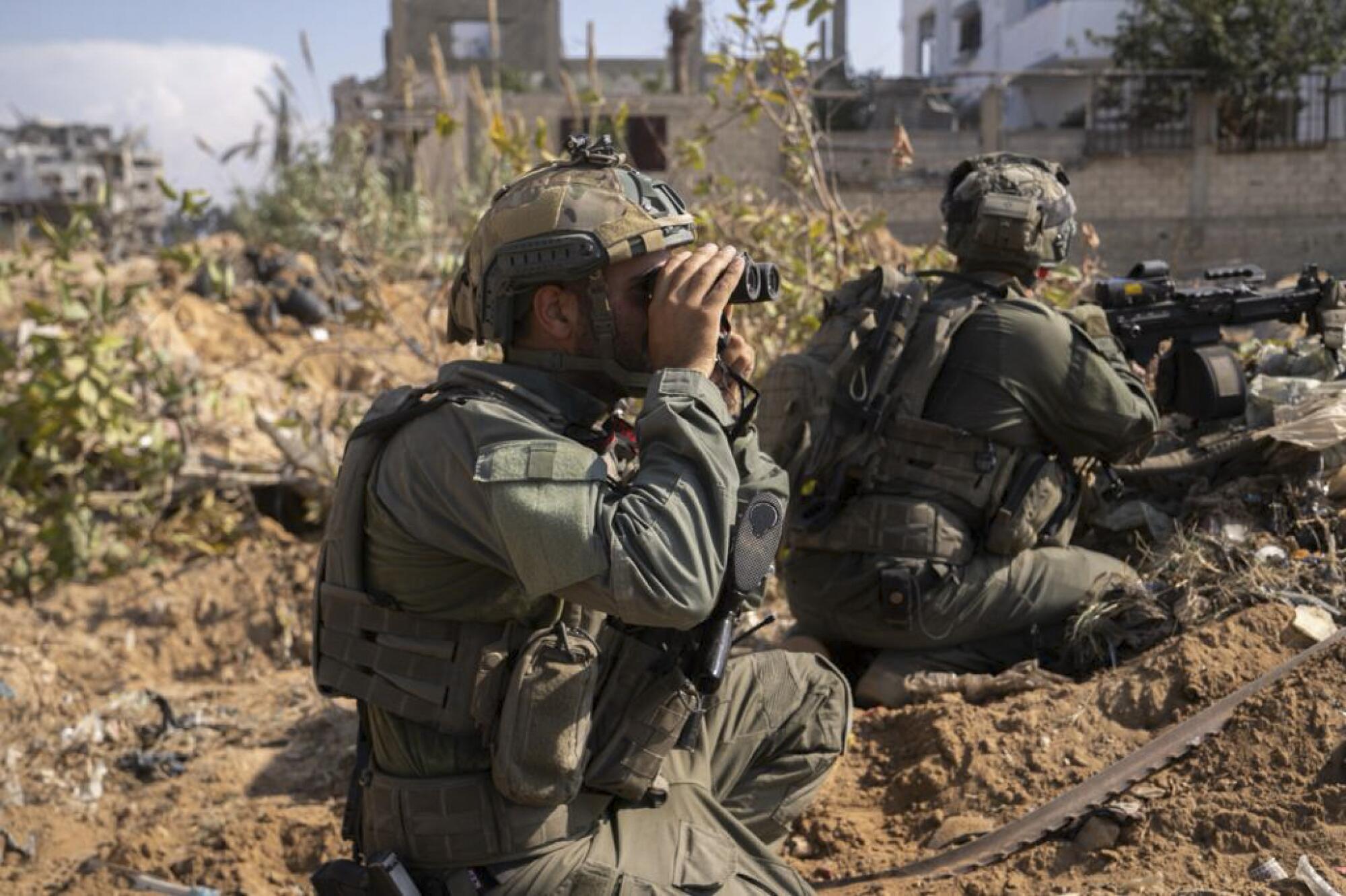
Israel has refused to allow fuel in, saying it fears Hamas would steal it for military purposes. The military released a recording of what it said was a Hamas commander forcing a hospital to hand over some fuel. The recording could not be independently verified.
Only hours of electricity remained at Gaza City’s largest hospital, Shifa, according to its director, Mohammed Abu Salmia, who pleaded for “whoever has a liter of diesel in his home” to donate it.
The Turkish-Palestinian Hospital, Gaza’s only facility offering specialized treatment for cancer patients, was forced to shut down Wednesday because of a lack of fuel, leaving 70 cancer patients in a critical situation, the Health Ministry said.
The Indonesian Hospital in northern Gaza, where many people wounded in strikes on the Jabaliya refugee camp outside Gaza City were being treated, was forced to turn off most lights and its mortuary refrigerators.
“These exceptional measures will allow the Indonesian Hospital to work for a few more days,” Health Ministry spokesman Ashraf Qidra said. “However, if we cannot secure electricity or fuel, then we will face a disaster.”
More to Read
Sign up for Essential California
The most important California stories and recommendations in your inbox every morning.
You may occasionally receive promotional content from the Los Angeles Times.
